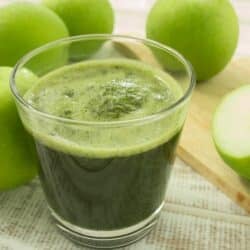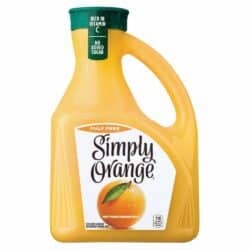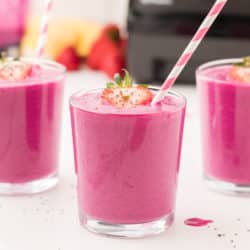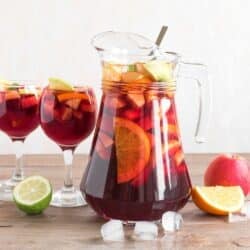Orange Juice Vs. Apple Juice – Which is Best?
When it comes to flavor and nutrition, orange juice and apple juice have similarities and differences. Learn how each stacks up in this comparison of orange juice versus apple juice. This article will help you determine which of these fruit juices is best for you.
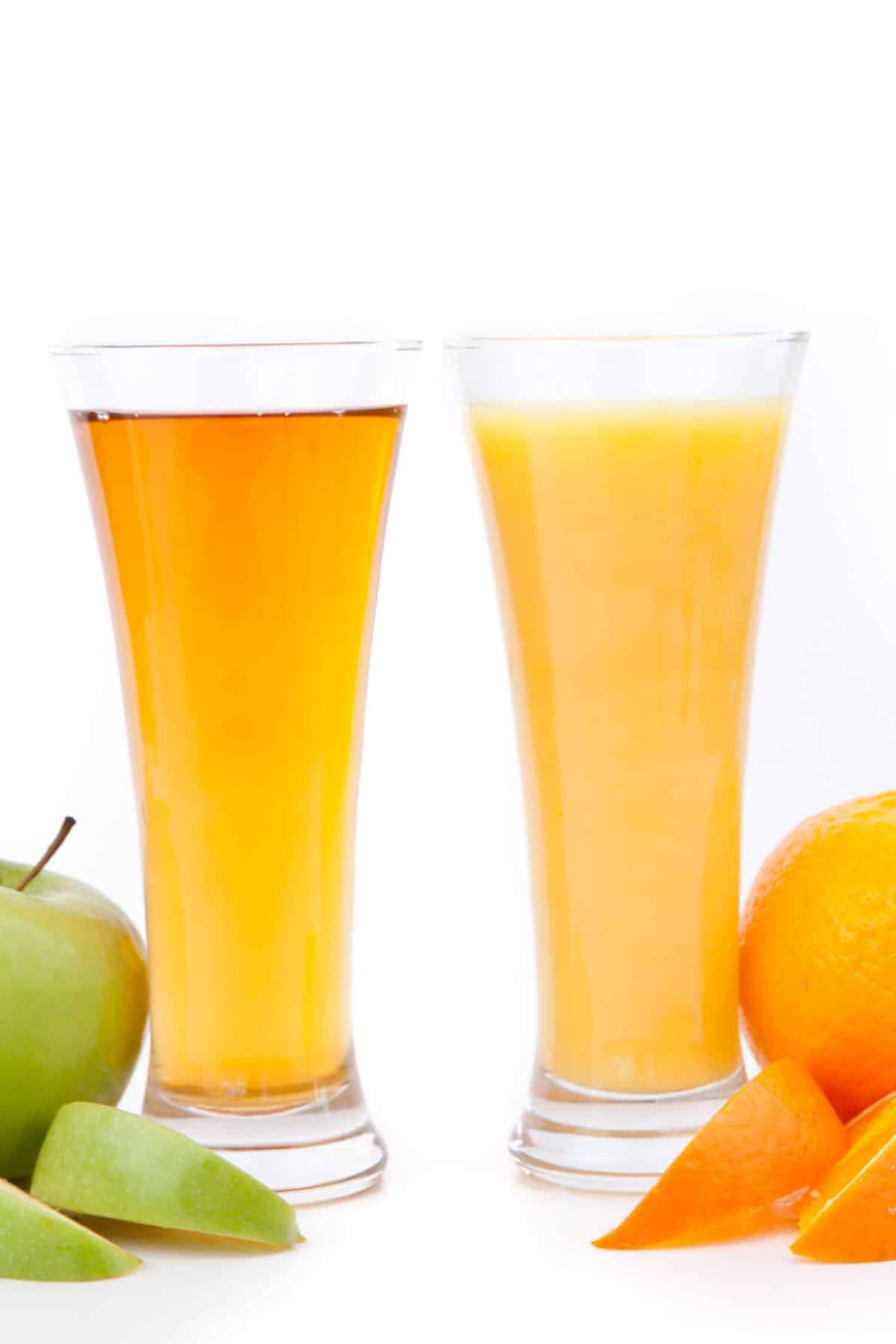
Orange Juice Highlights
Orange juice is one of the most popular breakfast drinks around. It has a naturally sweet but zesty flavor and a tangy, citrusy aroma.
Oranges are a citrus fruit that can be part of a healthy diet. They have a higher sugar content than other fruits (including apples), but these are natural sugars.
Making orange juice involves two main steps: pressing the whole fruit to extract the juice, and then filtering the pulp out of it. The juice is made up of natural sugars, vitamin C, and potassium.
Orange juice is not just for breakfast either. It’s a great addition with everything from salads to smoothies and even cocktails.
In one cup of orange juice, there are approximately 111 calories, 0g of fat, and 21g of sugar, and 124mg of Vitamin C.
Orange juice is an excellent source of vitamin C and contains other nutrients that can help with blood pressure, heart health, and potentially reduce heart disease.

Apple Juice Highlights
Apple juice is a sweet and nutritious favorite across the United States. Many people and children enjoy apple juice as a snack.
To make it, whole apples are harvested, washed, milled and crushed to extract the juice. Afterward, the juice may be filtered, pasteurized, concentrated or frozen depending on how it will be used.
In terms of nutrition, a cup of pure apple juice contains approximately 114 calories, less than a gram of fat and 24 grams of sugar along with 95mg of your daily vitamin C needs.
Apple juice has about the same amount of sugar as orange juice. The overall nutritional values are similar, although orange juice has a slightly higher vitamin C content.
Orange Juice Vs. Apple Juice Taste Comparison
Orange juice and apple juice are both popular drinks but have quite different flavors.
Orange juice is usually tart and tangy with a hint of sweetness, while apple juice typically has a more mild sweetness compared to orange juice.
Furthermore, orange juice has a unique acidic undertone that distinguishes it from other juices, whereas apple juice has a slightly earthy flavor.
It usually ended up being personal preference as to which juice you will prefer over the other. There is no definitive answer as to which one tastes better.
Try my Mimosa Mocktail recipe that uses fresh orange juice!
Calorie Comparison
Apple juice has slightly more calories than orange juice, with each cup containing around 114 calories compared to the 111 calories in a single cup of orange juice.
However, depending on the amount of added sugar to either drink, the calorie count may vary significantly!
To get the most health benefits from either drink, opt for an unsweetened variety since it will not contain artificial sweeteners or added sugars.
Vitamin C Comparison
Choosing between orange juice and apple juice for your daily dose of Vitamin C can be a difficult decision. While both juices provide the essential nutrient, the amount found in each juice varies according to the type and size of the fruit.
While oranges contain a higher concentration of Vitamin C than apples, the amount per serving depends on the size and varieties used.
Vitamin C is great for supporting skin health, making for a healthy immune system, and offering antioxidants which fight free radicals. It offers a range of health benefits.
Orange juice from concentrate may have a higher Vitamin C concentration than fresh apple juice. Some brands also add extra Vitamin C to their products, making them a healthier choice when you are looking to increase your intake of this important nutrient.
Ultimately, choosing an orange or apple juice that supplies a significant portion of your vitamin C needs is all about finding what works best for you.

Fiber Comparison
Orange juice and apple juice contain about the same amount of dietary fiber at 0.2 grams per serving each. Neither a cup of orange juice or a cup of apple juice provides much fiber at all.
If you are looking to increase your intake of fiber, eating the whole orange or apple would be a better choice than drinking the juice. Look for whole fruits at your local grocery store or at a farmers’ market.
FAQs
If you’re looking for a way to start your morning with a sweet kick, you might battle between whether to reach for a glass of orange juice or apple juice. The two juices are nearly identical when it comes to their sugar content, but a glass of apple juice contains a bit more sugar.
On average, an 8-ounce glass of apple juice contains 24 grams of sugar as opposed to 21 grams in an 8-ounce glass of orange juice. So if you’re hoping to reduce your daily intake of added sugars, reaching for some fresh-pressed orange juice might be a better option.
That said, if you are concerned about blood sugar levels or glycemic index, you may need to avoid drinking these types of juice and opt for the whole fruit instead. Even natural sugars might be too much sugar. Speak to your healthcare provider so you can make an informed decision.
When comparing orange juice and apple juice, it is important to consider the nutritional value of each option.
Generally speaking, both juices provide a good source of hydration along with crucial vitamins like vitamin C. However, orange juice contains more potassium than apple juice, so if you are looking for an extra boost in your daily nutrient intake then choosing orange juice is the way to go.
Some people with blood sugar issues such as pre-diabetes may need to be cautious when drinking fruit juices. Speak with your healthcare provider if you have questions about your individual situation.
In packaged fruit juice, ascorbic acid (vitamin C) is often added as a preservative to extend shelf life and prevent oxidation. Additionally, it helps retain the color of the juice and enhances its nutritional value, compensating for vitamin C losses during processing and storage.
Citric acid is a weak organic acid commonly used in packaged fruit juices and other foods as a preservative, flavor enhancer, and acidulant. It imparts a sour or acidic taste and helps prevent the growth of bacteria, thereby extending the product’s shelf life. Additionally, citric acid can act as an antioxidant, preventing the discoloration and oxidation of the juice.
Apple juice that is unfiltered may appear cloudy. Cloudy apple juice is not necessarily a bad thing. Apple cider with the mother may also appear cloudy.
More Juice Recipes and Resources You Might Like
Conclusions
Orange juice and apple juice are both popular drinks with different flavors. Ultimately, it is important to consider the nutritional value of each option when deciding which one to choose for your daily dose of hydration and essential nutrients. Whether you opt for orange or apple juice, both are healthy alternatives to sugary drinks.
Don’t forget to join my newsletter list to get exclusive clean eating recipes and tips. The newsletter is 100% free with no spam; unsubscribe anytime.
About the Author: Carrie Forrest has a master’s degree in public health with a specialty in nutrition and is a certified holistic nutritionist. She is a top wellness and food blogger with over 5 million annual visitors to her site. Carrie has an incredible story of recovery from chronic illness and is passionate about helping other women transform their health. Send her a message through her contact form.
Note: this post is for informational purposes only and is not intended as medical advice. Please consult your healthcare provider for recommendations related to your individual situation.



